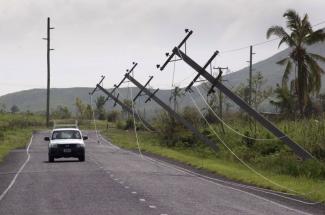Climate change
Pay particular attention to the poor

In a working paper published in late 2016, Emmanuel Alano and Minsoo Lee, two ADB experts, assess the macroeconomic implications of natural disasters, with a focus on typhoons and droughts. They show that extreme weather is likely to harm agriculture and tourism, and may thus “roll back years of development gains and exacerbate inequality”.
Cyclones, they write, are prone to reducing economic growth by up to three percentage points. If a country is set on a permanently lower growth path, such losses are never recovered. In other cases, it may take many years to get back to the pre-disaster trend. The authors acknowledge that a disaster can also spur growth, if better infrastructure is built to replace what was destroyed. They warn, however, that it normally takes two decades for a country to recover from a cyclone.
Some storms are utterly devastating. According to the ADB, the damages caused by Cyclone Winston, which hit Fiji in February 2016, amounted to more than $ 500 million or about 11 % of gross domestic product. Moreover, 25 % of tourism bookings were cancelled immediately after the event.
At typical drought will reduce the annual growth rate by one percentage point, the experts argue. They point out, moreover, that rising temperatures in general mean less favourable conditions for agriculture. In their eyes, climate change is thus set to harm the livelihoods of poor rural communities in particular.
The ADB experts propose several ways to adapt to growing risks, including urbanisation, building climate-resilient infrastructure and establishing better early-warning and disaster-response systems. They emphasise that diversified economies are better at coping with hardship than those that depend primarily only on agriculture and perhaps tourism. Farmers are likely to lose their entire harvest. Businesses in other industries rebound faster, the ADB authors argue. They praise urbanisation, as it leads to diversification, higher wages and more opportunities in general.
To some extent, the inflow of international aid can compensate disaster damages, the working paper acknowledges. It states, however, that aid is unlikely to suffice in the long run in view of increasing damages. Moreover, it reduces incentives to invest in adaptation.
The authors appreciate multilateral approaches to risk management. They praise the Caribbean Catastrophe Risk Insurance Facility (CCRIF), and find its model is worth copying. CCRIF is a multilateral insurance scheme. It charges premiums from governments which, in return, get immediate relief when disaster strikes. In 2016, the government of Haiti received almost $ 20 million from CCRIF after the island nation was hit by Hurricane Matthew. The facility paid another $ 9 million to other governments in the affected region (see D+C/E+Z e-Paper 2016/12, p. 20).
The ADB working paper also points out that prosperous nations have social-protection systems that prove useful in emergencies. Poor countries lack such systems and thus face an “adaptation deficit”. The authors make it very clear that policymakers must pay attention to social inequality: “Since the poor suffer the most from the effects of natural disaster shock, adaptation efforts should address needs such as relocation, resilient infrastructure, new resistant crops and government transfers to more sustainable ex-ante strategies and risk-sharing mechanisms like disaster insurance.”
Hans Dembowski
Link
Alano E., and Lee, M., 2016: Natural disaster shocks and macroeconomic growth in Asia. ADB Economics Working Paper Series No. 503.
https://www.adb.org/sites/default/files/publication/218461/ewp-503.pdf








